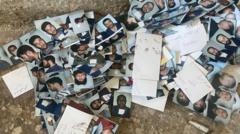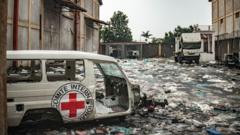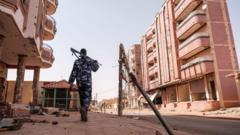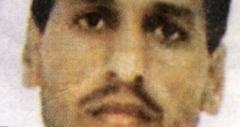As the recent shift in power in Syria allows families to search for disappeared loved ones, a horrifying discovery at Adra cemetery reveals remains linked to the Assad regime's dark history of detainment and torture. Uncovering the truth has become imperative for those who suffer losses, while human rights organizations scramble to document evidence of atrocities.
Unearthing the Truth: Families Seek Closure for Syria's Disappeared

Unearthing the Truth: Families Seek Closure for Syria's Disappeared
In the wake of Bashar al-Assad's regime's retreat, families desperate for answers dig through the remnants of a brutal past, uncovering human remains and seeking justice for the lost.
Khaled al Hamad meticulously digs through Adra cemetery, where a shallow grave has been revealed beneath a concrete slab, unearthing bags containing human remains. His quest is to find his two brothers, Jihad and Hussein, who vanished a decade ago, presumably taken by the forces of President Bashar al-Assad's oppressive regime. The grim contents of the bags — skulls and bones, indicate the potential for a chilling history of abuse lurking under the soil.
"For years, we felt like we were living in a tomb," Khaled recounted, reflecting on the stifling atmosphere during Assad’s control. "You could not stop here; it was dangerous." These recent discoveries provide a glimmer of hope for families previously frozen in despair, now emboldened to learn the fate of thousands who disappeared due to Assad's brutal prison system.
As Khaled and others search for answers, Human Rights Watch has begun investigating similar reports across the region. The search for justice also extends to the now abandoned Mazzeh military airbase, where remnants of torture remain evident. Former detainees had revealed horrific details, including systematic torture and the sexual abuse of women.
Among piles of documents and photos at the base, families sift through missing persons records with a mix of hope and anguish, yet the disordered information complicates their searches. "How do we find them in all of this?" one distraught relative implored, highlighting the urgent need for an organized approach to documenting Assad's brutal legacy.
The upheaval in Syria, brought on by the fall of Assad, leaves open the many questions lingering from years of violence. International entities like the US and UK face scrutiny for their potential complicity in the regime’s practices, making accountability essential for both past and future actions.
In the shifting political landscape of Syria, the call for self-governance grows as local militants tear down remnants of the old regime in a symbolic rejection of its legacy. The chilling discoveries at Adra cemetery serve as a reminder of the unfinished business in the region—both in seeking justice for the deceased and in forging a new path forward.




















